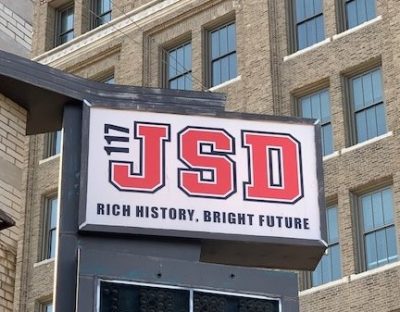The District 117 School Board officially approved the proposed 15% tax levy ask last night, but school administration says existing property owners won’t see their taxes increase near that much.
The Jacksonville School District Board of Education held a truth in taxation public hearing last night prior to the regular December meeting. The hearing is triggered anytime a taxing body requests more than 5% when setting a new levy.
Superintendent Steve Ptacek spent a lengthy period explaining why the district has to ask for so much of an increase over the previous year. He says because of PTELL, no matter how much the district ask is, existing property owners are capped at a 5% increase.
“The number one thing I want to clarify with everyone on the tax levy is that the property tax increase on existing property by PTELL is going to be limited to five percent or CPI (consumer price index) or five percent, whichever is lower.
So, therefore, I’m going to use last year as an example, last year’s CPI was at seven percent. All of the existing property in Jacksonville last year- on the total combined we had a five percent increase in the property taxes. But added on top of that every year is all of the new construction, and those new construction taxes can add on what we actually gain above that five percent.
We don’t know exactly how much new construction there is, especially with wind farms coming in and solar farms, and we all know we’ve got new coffee shops and other things around the city. So last year we asked for a ten percent increase and we got a nine-point two seven percent total increase in our taxes collected. Five percent of that was due to existing property and that was limited by the five percent or CPI whichever is lower rule. The other four point two percent was from new property that was added into the roll.”
The Property Tax Extension Limitation Law, or PTELL, was enacted by the General Assembly in the early 90s in an effort to cap how much taxing entities without home rule can increase property taxes, while still accounting for new growth in its area.
Ptacek says the combination of new construction and a PTELL cap at 5% meant many districts including 117 were left struggling to figure out how much new growth revenue they might very well end up missing out on.
“This year we didn’t know how much new property there was again, but we didn’t think we were going to be as close. Because if we don’t ask for what we could get, then we don’t get it. And in a PTELL district, we lose it forever. And when you lose all the increases it can be detrimental in the long run. So not really having an idea of exactly how much property is coming onto the tax rolls this year, we decided to ask for fifteen percent to make sure we capture any of that extra new property.
Now existing property owners should not have a concern because it’s not going to impact them, and I’ll give an example. If last year we’d asked twenty percent instead of ten percent, we still would have only gotten the nine-point two seven, and the existing property owners still would have had the capped five percent increase.
Now a five percent increase is the largest that we’ve ever had because CPI hasn’t been that high in the last twenty-five years. Bur people shouldn’t see that number because there is nobody who is going to have a fifteen percent property tax increase from our ask alone.”
Ptacek says if a property owner’s individual tax assessment went up dramatically over the year, they could see a much larger increase over the previous year’s tax bill, but the district doesn’t see any more money than the 5% capped by PTELL.
During his presentation, Ptacek said for example if District 117 had underasked by a half million dollars from their extension in 2012, the district would have lost $6.2 million in tax revenues this year.
He said if District 117 had missed out on the $6.2 million, they wouldn’t have had enough money, even with the bond sale, to complete the recent Washington Elementary renovation. Ptacek said during the presentation that anyone who has questions about the tax levy is welcome to contact him at the central office.
Last year, the district received just under 22% of its total revenue from local property tax revenues.




